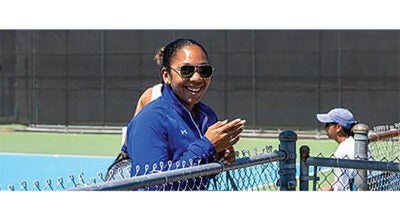ADs reluctant to bankroll baseball
Published 6:00 pm Wednesday, June 19, 2019
Well, what do you know? An actual Big Ten team is in control of its side of the bracket at the College World Series.
So it can be done, huh?
Michigan hasn’t won anything yet. But the Wolverines are one win away, with two chances to get it, of reaching next week’s best-of-three championship series.
So Michigan is kind of the talk of college baseball right now. In regional play it went way out to defending national champion Oregon State’s regional and won it. For the super regional, it stayed out west and beat No. 1-ranked UCLA to get to Omaha, where it’s now 2-0.
So it’s not impossible, even for teams that were listed among the “last four in” by the selection committee handing out the at-large tournament bids.
A cold-weather team can do it provided it thaws out in time for its conference tournament.
Not often, mind you.
For perspective, the last time Michigan baseball was in Omaha, 1984, Barry Larkin was its shortstop. More perspective: the last time the Wolverines were in the CWS, LSU had never been.
Michigan had to overcome all the baseball things the Big Ten whines about, mostly weather, and the stubbornness of the Sun Belt states not to accommodate them by starting the season in May or some such.
Mostly, though, Michigan apparently has had to overcome its own Big Ten leadership and its apathy towards the sport.
Let that conference whine no more about how the deck is stacked against it in baseball.
The latest example came last April and was more proof that college baseball right now is thriving and growing in spite of itself — or, if not itself, at least in spite of its campus leadership.
The Southeastern Conference, which has always led the way in college baseball with this nutty notion that the sport can be fun and often profitable on campus, made a proposal to add a third paid assistant coach to the baseball staffs.
Seemed like a no-brainer, especially because the proposal didn’t say schools had to pay a third full-time assistant. It only proposed that they could if they felt so moved.
As it stands, a third assistant is a volunteer and can’t be paid. He can pick up some walking-around money working his school’s summer camps and probably work a morning job to eke out a living.
But he can’t be paid for coaching — nor can he recruit, which hampers the ability to learn the ropes and move up to a cash-paying job.
That’s the way it stands after the proposal was defeated by the Division I baseball council, which is made up not of baseball people but mostly athletic directors.
So it’s not baseball people making the decision about baseball. It’s people keeping a tight fist on the pocket book.
But the Big Ten, which raked in $759 million in revenue for last fiscal year and doled out $54 million to each of its schools, voted against it.
Maybe it was because the SEC proposed it.
Of course, the Big Ten had some company in voting down the measure, most surprisingly, according to a report by D1Baseball.com, the Big 12, which is also flush in cash and takes baseball seriously.
More shockingly, filthy-rich (and six-time national champion) Texas was against it. Oklahoma, too. And Texas Tech, which is playing in Omaha.
By the way, congratulations to the Southland Conference. Although hardly rolling in dough, it voted for the good of the game.
The college game will survive.
The third coach thing was hardly the biggest obstacle, and because it was seemingly the easiest to correct, it would appear they’ll never address the main problem.
That would be the measly 11.7 scholarships that schools are allowed to fill a 35-man roster (only 27 of which can be on any scholarship).
Women’s basketball gets 15 scholarships to put a quintet on the floor.
Assuming you’re using a pitcher, baseball needs 10 just to take the field, and, even sans a bullpen, that bare-bones minimum really is more like 14 because you’ll need at least five starting pitchers to get through most weeks.
So you end up with partial scholarships, if that, for the only college sport that recruits directly against the pros’ checkbooks for high school talent.
Every year, just before the College World Series at the joint news conference of the eight coaches on hand, it’s the common complaint, has been for years.
And nothing ever happens about it.
Yet somehow the sport thrives.
Imagine what it could be if it got any support at all from athletic department leaders.
Scooter Hobbs covers LSU athletics. Email him at shobbs@americanpress.com





